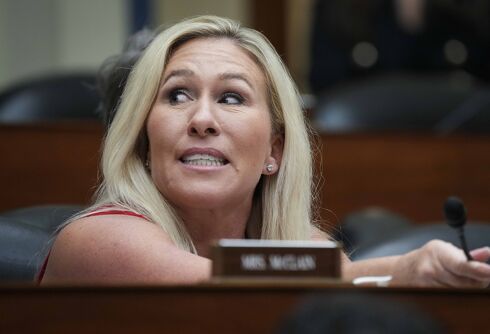The county elections board that disqualified a transgender candidate for Ohio state office because she did not include her deadname on petitions circulated to potential voters is refusing to reverse its decision, even after pressure from the state’s governor and other trans candidates being to run for office without disclosing their deadnames in Ohio.
Despite collecting enough signatures to run as a Democrat for Ohio’s firmly Republican House District 50, real estate photographer Vanessa Joy learned earlier this month that she had been disqualified from the race by the Stark County Board of Elections due to an obscure state law requiring candidates to disclose any name changes that have taken place within the last five years.
Related:
Trans candidate booted from ballot because she didn’t tell everyone her deadname
People who get married don’t have to disclose their previous names to run for office in Ohio, but apparently trans people do.
Notably, the 1995 law was not mentioned in the Ohio secretary of state’s 2024 candidate guide and has not been included in previous candidate guides in recent years. Nor did the candidacy petition form Joy filled out include any mention of the law or space to list any name changes.
Insights for the LGBTQ+ community
Subscribe to our briefing for insights into how politics impacts the LGBTQ+ community and more.
Joy requested a reconsideration of the decision, according to a January 19 statement from the Stark County Board of Elections. The board denied her request, citing an Ohio Supreme Court case that found that the law is “unambiguous,” that the “intent behind the candidate’s use of a different name is not relevant,” and that it could not “add an exception that does not appear in the statutory language.”
“The Stark County Board of Elections is sympathetic to Vanessa Joy’s argument that the campaign election guide put out by the Ohio Secretary of State was not specific enough,” the statement read.
The board added that its “decision must be based on the law and cannot be arbitrarily applied.” However, Joy was one of four transgender candidates running for Ohio office this year. Two others, Bobbie Arnold and Arienne Childrey, had their candidacies for Ohio state House seats challenged under the law. Both have since been cleared to have their names appear on the November ballot. Still, according to the Associated Press, both Arnold and Childrey could technically be removed from office if Joy does not succeed in challenging the law.
A fourth trans candidate, Ari Faber, has not had his candidacy for Ohio’s state Senate challenged. Faber has not legally changed his name and is running with his birth name on the ballot, NBC News reports.
While Joy told the AP that, for now, her campaign is over, she is working with an attorney to get the law changed. “I’m out of the race, but I’m not out of the fight,” she said.
Last week, Ohio Gov. Mike DeWine (R) said that trans candidates should not be disqualified for not listing their deadnames and argued for changes to ensure that future candidates will be aware of the little-known law.
According to the AP, Ohio’s Republican Secretary of State Frank LaRose said that his team will include the law in future candidate guides but opposed changing the law itself.















